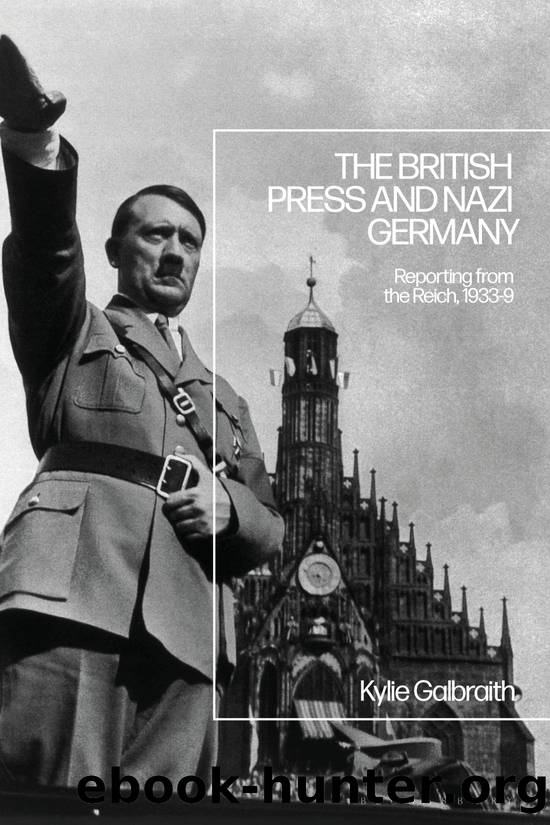The British Press and Nazi Germany by Kylie Galbraith;

Author:Kylie Galbraith;
Language: eng
Format: epub
ISBN: 9781350102118
Publisher: Bloomsbury UK
7
The Nazi persecution of the Jews
Anti-Semitism was central to Nazi Party doctrine. British correspondents, living and working in Germany, had observed and reported the rise of anti-Semitism in the country during the Weimar Republic, focusing, in particular, on the role of anti-Semitism in German politics. After Hitler came to power in January 1933, the Manchester Guardian discussed the possibility that the Jews would be the next to be targeted because âAnti-Semitism has, of course, always been a cardinal point in Nazi propagandaâ.1 The Daily Express reported the day before the 5 March elections that the âexodus of the Jews of Germany has begunâ.2 Many Jews had sought refuge in Czechoslovakia and Austria, and more were sure to follow: âFaced with the menace of an anti-Semitic reign of terror in the event of a victory for the Hitlerites in to-morrowâs elections, many Jews have already left Germany, and large numbers are preparing for voluntary exile.â3 The Daily Express observed:
Nothing since the mass persecution of the Jews in Czarist Russia has equalled the campaign of anti-Semitic hatred by the German Nazis. Threats of physical violence and undisguised incitements to wholesale âpogromsâ have been a feature of thousands of inflammatory speeches by the leaders and rank and file of the Nazi party.4
Following the election, the Nazis sought to consolidate their control over Germany. This included a brutal campaign of repression and violence against their âenemiesâ, including Jews. The terror and the violence against the Jews in Germany were reported internationally. A report by F. A. Voigt, special correspondent for the Manchester Guardian, observed: âThe anti-Semitic outrages of the last four weeks are far more horrible than could reasonably have been imagined at first. Nothing like them has been known in Germany for generations.â5 The Jewish Chronicle pointed out that while the violence might not be an âactual pogromâ âthe individual outrages â probably not all of them known â amount, in the aggregate, to something perilously approaching oneâ.6 Voigt described the campaign against the Jews:
Jewish shops have been closed and raided, Jewish homes have been searched and thrown into disorder, and hundreds of Jews have been beaten and robbed. . . . The worst excesses in Berlin occurred on March 9, most of the victims living in the Grenadierstrasse. Many Jews were beaten by Brown Shirts until the blood streamed down their heads and faces and their backs and shoulders were bruised.7
The violence was accompanied by a wave of dismissals as Jews were removed from their positions at universities, medical practices and law courts by SA men, local Nazi leaders and Nazi students. âWhat is to become of them no one knowsâ, Voigt reported. He commented: âIt is a most frightful comment on German civilisation that Jews should be escaping from Germany into Poland. Poland since Hitler has been Chancellor is undoubtedly a country of greater freedom than Germany.â8 It was hoped that Hitlerâs call for a halt to the violence would make a difference and reduce excesses committed. But, reported the Jewish
Download
This site does not store any files on its server. We only index and link to content provided by other sites. Please contact the content providers to delete copyright contents if any and email us, we'll remove relevant links or contents immediately.
| Africa | Americas |
| Arctic & Antarctica | Asia |
| Australia & Oceania | Europe |
| Middle East | Russia |
| United States | World |
| Ancient Civilizations | Military |
| Historical Study & Educational Resources |
Magic and Divination in Early Islam by Emilie Savage-Smith;(1533)
Papillon by Henry Charrière(1426)
Bohemians, Bootleggers, Flappers, and Swells: The Best of Early Vanity Fair by Bohemians Bootleggers Flappers & Swells- The Best of Early Vanity Fair (epub)(1394)
Ambition and Desire: The Dangerous Life of Josephine Bonaparte by Kate Williams(1384)
Twelve Caesars by Mary Beard(1313)
Operation Vengeance: The Astonishing Aerial Ambush That Changed World War II by Dan Hampton(1155)
What Really Happened: The Death of Hitler by Robert J. Hutchinson(1154)
London in the Twentieth Century by Jerry White(1145)
The Japanese by Christopher Harding(1130)
Time of the Magicians by Wolfram Eilenberger(1125)
Twilight of the Gods by Ian W. Toll(1117)
Lenin: A Biography by Robert Service(1074)
The Devil You Know by Charles M. Blow(1024)
A Social History of the Media by Peter Burke & Peter Burke(968)
Freemasons for Dummies by Hodapp Christopher;(964)
Napolean Hill Collection by Napoleon Hill(939)
Henry III by David Carpenter;(919)
The Rise and Triumph of the Modern Self by Unknown(913)
Richard III (The English Monarchs Series) by Charles Ross(906)
